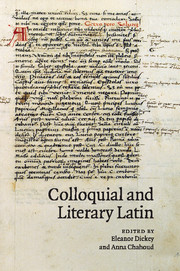Book contents
- Frontmatter
- Contents
- List of contributors
- Acknowledgements
- Foreword (David Langslow)
- PART I THEORETICAL FRAMEWORK
- PART II EARLY LATIN
- PART III CLASSICAL LATIN
- 10 Hyperbaton and register in Cicero
- 11 Notes on the language of Marcus Caelius Rufus
- 12 Syntactic colloquialism in Lucretius
- 13 Campaigning for utilitas: style, grammar and philosophy in C. Iulius Caesar
- 14 The style of the Bellum Hispaniense and the evolution of Roman historiography
- 15 Grist to the mill: the literary uses of the quotidian in Horace, Satire 1.5
- 16 Sermones deorum: divine discourse in Virgil's Aeneid
- PART IV EARLY PRINCIPATE
- PART V LATE LATIN
- Abbreviations
- References
- Subject index
- Index verborum
- Index locorum
16 - Sermones deorum: divine discourse in Virgil's Aeneid
Published online by Cambridge University Press: 04 April 2011
- Frontmatter
- Contents
- List of contributors
- Acknowledgements
- Foreword (David Langslow)
- PART I THEORETICAL FRAMEWORK
- PART II EARLY LATIN
- PART III CLASSICAL LATIN
- 10 Hyperbaton and register in Cicero
- 11 Notes on the language of Marcus Caelius Rufus
- 12 Syntactic colloquialism in Lucretius
- 13 Campaigning for utilitas: style, grammar and philosophy in C. Iulius Caesar
- 14 The style of the Bellum Hispaniense and the evolution of Roman historiography
- 15 Grist to the mill: the literary uses of the quotidian in Horace, Satire 1.5
- 16 Sermones deorum: divine discourse in Virgil's Aeneid
- PART IV EARLY PRINCIPATE
- PART V LATE LATIN
- Abbreviations
- References
- Subject index
- Index verborum
- Index locorum
Summary
INTRODUCTION
This contribution looks at some of the divine scenes in the Aeneid and the language used by gods in speeches, considering them as a special case of the presence and transformation of colloquial language in a high literary context. The language of the Aeneid is generally acknowledged to be a Kunstsprache, an artificial construction, and the language of these scenes is likely to be especially stylised given that they feature the most elevated category of characters in the most elevated of poetic genres. Nevertheless, here I try to show how the artificial language of epic in these scenes of divine conversation echoes typical features of colloquial speech, characteristically combining such traces of familiar discourse with high poetic elements. I also suggest that stylistic choice in these scenes is more often determined by the dramatic and literary requirements of plot, scene or characterisation than by any consistent theory of the language of the gods in general.
‘COLLOQUIALISM’ IN THE AENEID
First, we face the issue of defining ‘colloquial’ features in literary texts. Anna Chahoud's analysis in Chapter 4 of this volume (section 3.2) provides a useful list of colloquial features of language in Latin, and I will here try the experiment of applying it as a template for analysing Virgil's text.
- Type
- Chapter
- Information
- Colloquial and Literary Latin , pp. 266 - 278Publisher: Cambridge University PressPrint publication year: 2010
- 1
- Cited by



